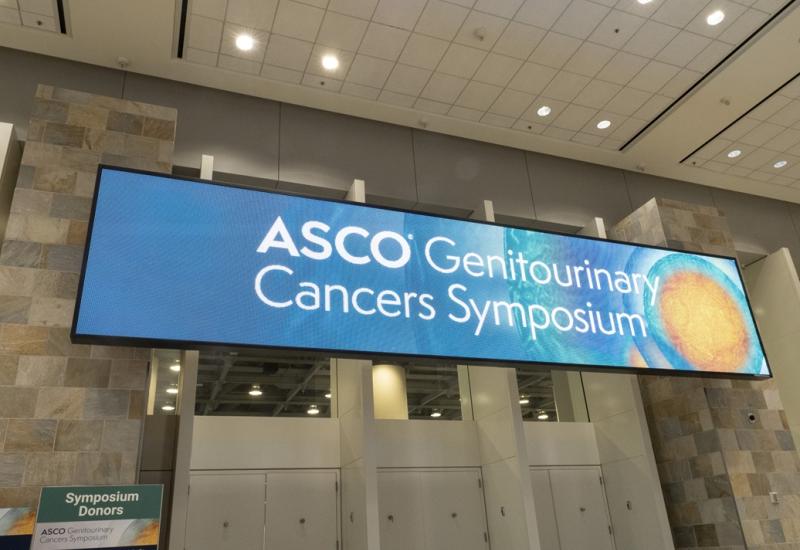
ESMO 2025 preview – a bemarituzumab reckoning approaches
Meanwhile, Astra, Merck and Novartis look for new Enhertu, Keytruda and Pluvicto additions.
Meanwhile, Astra, Merck and Novartis look for new Enhertu, Keytruda and Pluvicto additions.

Amgen and Zai Lab have caused confusion with changing statements about their anti-FGFR2b monoclonal antibody bemarituzumab in the pivotal Fortitude-101 trial, but things could become clearer at ESMO: the study will feature among conference’s presidential sessions, according to recently revealed late-breaking titles.
Elsewhere positivity reigns, with many other featured trials already toplined as successful. Largely, these involve attempts to expand existing drugs into new indications, for example neoadjuvant breast cancer for AstraZeneca and Daiichi’s Enhertu, platinum-resistant ovarian cancer for Merck & Co’s Keytruda, and hormone-sensitive prostate cancer for Novartis’s Pluvicto.
Arguably the hottest area of drug development, PD-(L)1 x VEGF, will also be present, thanks to Summit and Akeso’s ivonescimab. However, this might not be the study that investors were awaiting: Sunday will see presentation of Harmoni-6, a Chinese first-line NSCLC trial that pitched ivonescimab plus chemo against a chemo combo with BeOne’s Tevimbra, rather than the more relevant Keytruda.
Some analysts had hoped to see overall survival data from another Chinese trial, Harmoni-A, which Akeso said was positive in August. That study, in second-line disease, is being used as a yardstick for the global Harmoni trial, although there remain serious doubts about whether the project will make it to the US market.
Fortitude needed
Doubt is also the watchword for Amgen’s Fortitude-101 trial, which tests bemarituzumab plus chemo, versus chemo alone, in first-line gastric or GEJ cancers with FGFR2b-overexpression (defined as 10% expression or higher).
In June the trial was said to have met its primary overall survival endpoint at interim analysis. However, even at the time the wording of the press release raised concerns about ocular toxicity.
And earlier this month Amgen disclosed that, at final analysis, the magnitude of the benefit had “attenuated”. Investors will hope to see the extent of this at ESMO, and whether ocular toxicity indeed played a role.
Zai Lab, which has Chinese rights to the project, will await data from another phase 3, Fortitude-102, before filing. That study evaluates bemarituzumab plus Opdivo and chemo, in the same population, and is due to read out in late 2025 or early 2026.
Neoadjuvant breast Destiny
Astra and Daiichi have been trying to push their anti-HER2 ADC Enhertu into early cancer settings, and have been rewarded by wins in the front-line Destiny-Breast09 and, more recently, neoadjuvant Destiny-Breast11 trials; the latter will feature at ESMO.
Although the partners reported success in May with Enhertu followed by paclitaxel, Herceptin and Perjeta, an Enhertu monotherapy arm was discontinued after an interim analysis. This could raise questions about the cost of having to use three HER2-directed therapies in the neoadjuvant setting.
Keytruda will feature in two presidential presentations, involving the Keynote-905 trial of a Padcev combo in perioperative cisplatin-ineligible muscle-invasive bladder cancer, and the Keynote-B96 study in platinum-resistant ovarian cancer.
The latter could help Keytruda become the first PD-(L)1 inhibitor approved in this setting. Merck touted a PFS benefit in all-comers, but ESMO attendees will want to know whether this was driven by PD-L1 expressers.
Meanwhile, Keytruda plus Padcev are already a standard of care in first-line metastatic bladder cancer, but Keynote-905 could push the combo into earlier use, before and after bladder removal surgery (cystectomy), the current standard of care.
The trial also has a perioperative Keytruda monotherapy arm, with evaluation continuing. MIBC makes up around 30% of bladder cancer cases, and up to half are cisplatin-ineligible, the partners said.
PSMAddition addition
In March Novartis finally got its PSMA-targeting radiopharmaceutical Pluvicto FDA approved for its second use, pre-chemo PSMA-positive metastatic castrate-resistant prostate cancer, based on the PSMAfore study. The decision was delayed by a negative overall survival result, confounded by a high rate of crossover, leaving Novartis to rely on an adjusted OS analysis.
Now the company hopes to go earlier, into metastatic hormone-sensitive disease, with the PSMAddition trial, details from which will be unveiled at ESMO. The company claimed a win here in June, citing a “statistically significant and clinically meaningful” benefit with Pluvicto plus hormone therapy, versus hormone therapy alone, on the primary endpoint of radiographic PFS.
So far Novartis has only noted a “positive” OS trend in PSMAddition; the company has said it hopes to file Pluvicto in hormone-sensitive disease this year, based on final rPFS and updated OS results, so will have to hope that history doesn't repeat itself.
While these are some of ESMO's key presentation there’s still room for late additions, with several late-breakers apparently not yet allocated. Notably, Roche has indicated that it hopes to present the Evera study of the oral SERD giredestrant at the meeting.
Notable presidential presentations at ESMO 2025
| Study | Project(s) | Company | Details | Abstract |
|---|---|---|---|---|
| Destiny-Breast11 | Enhertu | AstraZeneca/ Daiichi | Neoadjuvant HER2+ve breast cancer (+ THP, vs THP) | 291O |
| Keynote-905/ EV-303 | Padcev + Keytruda | Pfizer/ Astellas/ Merck & Co | Perioperative cisplatin-ineligible MIBC (vs surgery) | LBA2 |
| Keynote-B96/ Engot-ov65 | Keytruda | Merck & Co | Platinum-resistant ovarian cancer (+ chemo +/- Avastin, vs chemo +/- Avastin) | LBA3 |
| Harmoni-6 | Ivonescimab | Akeso/ Summit | 1st-line squam NSCLC (+ chemo, vs Tevimbra + chemo) | LBA4 |
| Optitrop-Lung04 | Sacituzumab tirumotecan | Kelun/ Merck & Co | 2nd-line EGFRm NSCLC (vs chemo) | LBA5 |
| PSMAddition | Pluvicto | Novartis | Hormone-sensitive prostate cancer (+ ADT + ARPI, vs ADT + ARPI) | LBA6 |
| Ph1 IMA203-101 | Anzutresgene autoleucel (IMA203) | Immatics | Uveal melanoma cohort of solid tumour trial | 1600O |
| Fortitude-101 | Bemarituzumab | Amgen/ Zai Lab | FGFR2b-overexpressing gastric/GEJ cancers (+ chemo, vs chemo) | LBA10 |
ADT=androgen deprivation therapy; ARPI=androgen receptor pathway inhibitor; MIBC=muscle-invasive bladder cancer; THP=paclitaxel, Herceptin & Perjeta. Source: ESMO.
ESMO will take place in Berlin on 17-21 October.
5488













